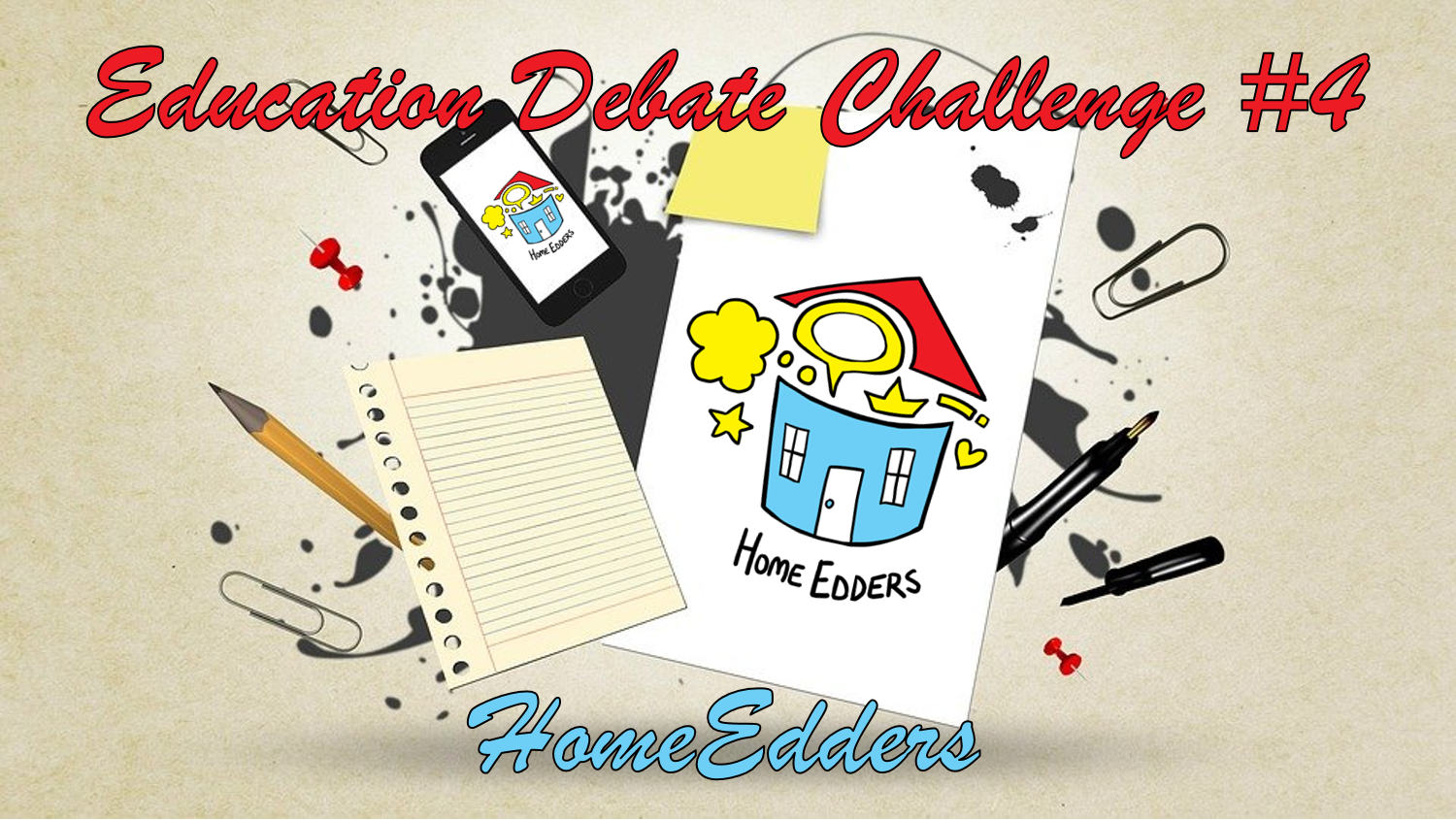

We often give children answers to remember instead of problems to solve.
Roger Lewin.
With this quote I would like to start my participation in the initiative Education Debate Challenge #4 of the @homeedders community. It leads me to consider that the traditional educational model is based almost solely and exclusively on memorizing, without associating this knowledge with a reason. Developing logic is important in turn to develop the so-called critical thinking. If we only rely on memory when learning, what would differentiate us from a USB device?
Taking into account the health crisis we live in, I cannot help but be critical of the way education is implemented, especially in my country Venezuela. For this reason, I will focus the content of this publication on personal judgments and opinions, based on my experience as a teacher and counselor of a group of young people who are currently receiving distance education. To this end, I will answer two questions raised in the challenge.
A menudo damos a los niños respuestas que recordar en lugar de problemas a resolver.
Roger Lewin.
Con esta cita quiero iniciar mi participación en la iniciativa Education Debate Challenge #4 de la comunidad @homeedders. La misma, me lleva a considerar que el modelo educativo tradicional se basa casi única y exclusivamente en memorizar, sin asociar dicho conocimiento a un porqué. Desarrollar la lógica es importante a su vez para desarrollar el llamado pensamiento crítico. Si solo nos basamos en la memoria a la hora de aprender, ¿qué nos diferenciaría de un dispositivo USB?
Al tomar en cuenta la crisis sanitaria que vivimos, no puedo evitar ser crítico de la manera en que la educación es implementada, especialmente en mi país Venezuela. Por tal motivo, centraré el contenido de esta publicación en emitir juicios y opiniones personales, basado en mi experiencia como docente y orientador de un grupo de jóvenes que en la actualidad reciben educación a distancia. Para tal fin, daré respuesta a dos interrogantes planteadas en el desafío.
This question has made me think for a long time, I spent a whole day thinking about how to answer, this is because any education that we receive, prepares us in some way for the future. However, will that preparation bring positive benefits? That is the question, and that is where my criticisms arise. While it is true that distance education comes as a sanitary measure to avoid exposing the student population, its effectiveness may not be the most appropriate for the intellectual and professional development of students.
This is due to many factors, first and foremost is the issue of technology. Many families do not have the necessary means for children and / or young people to have access to these resources, at least a smartphone with internet connection is essential, and in Venezuela the service is often fatal, connection failures are constant during the day. Also, it should be considered that the economic crisis that the country is going through, puts many parents in check, being forced to prioritize food over any other need.
Secondly, there is the work of teachers, some of whom are also parents, and those who are not, must also reinvent themselves daily to be able to guarantee their food. It is a tangible reality that we live daily, and this makes the responsibility of attending to students of lesser importance, most are limited to receive only the pending assignments to give a grade, leaving aside the basic principle of teaching, which is precisely to reinforce the theoretical knowledge acquired by reinforcing it with practical learning strategies that promote and contribute to a greater and better understanding of the content addressed.
Thirdly, there is the role of the family, in many homes the responsibility is left to the young person to do their homework without any help or supervision, few parents are involved in this process, and I do not judge them because as I said before, the priority at home is food. However, there are some who resort to third parties to guide the child and / or young person in this process, as in my case, I provide advice and guidance to a group of students, reinforcing their theoretical assignments with dynamics and practical strategies that facilitate learning.
Now, these arguments lead me to the following question.
Esta pregunta me ha hecho reflexionar durante largo tiempo, pasé un día entero pensando cómo responder, esto se debe a que toda enseñanza que se recibe, nos prepara en cierta manera para el futuro. No obstante, ¿Esa preparación aportará beneficios positivos? Ese es el asunto, es allí donde surgen mis críticas. Si bien es cierto que la educación a distancia llega como medida sanitaria para evitar exponer a la población estudiantil, su eficacia quizás no sea la más apropiada para el desarrollo intelectual y profesional de los estudiantes.
Esto se debe a muchos factores, en primer lugar está el tema de la tecnología. Muchas familias no disponen de los medios necesarios para que los niños y/o jóvenes tengan acceso a estos recursos, al menos un teléfono inteligente con conexión a internet es indispensable, y en Venezuela el servicio suele ser fatal, las fallas de conexión son constantes durante el día. También, se debe considerar que la crisis económica que atraviesa el país, pone en jaque a muchos padres de familia, viéndose obligados a priorizar la alimentación por encima de cualquier otra necesidad.
En segundo lugar está la labor docente, algunos también son padres y madres de familia, y el que no lo es, también debe reinventarse a diario para poder garantizar sus alimentos. Es una realidad tangible que vivimos a diario, y esto hace que la responsabilidad de atender a los estudiantes resulte de menor importancia, la mayoría se limita a recibir únicamente las asignaciones pendientes para darle una calificación, dejando a un lado el principio base de enseñanza, que es precisamente reforzar ese conocimiento teórico adquirido reforzandolo con estrategias de aprendizajes prácticas, que fomenten y contribuyan a un mayor y mejor entendimiento de los contenidos abordados.
En tercer lugar está el papel de la familia, en muchos hogares se deja la responsabilidad al joven de que realice sus asignaciones sin ningún tipo de ayuda o supervisión, pocos padres se involucran en ese proceso, y no los juzgo porque lo decía anteriormente, la prioridad en casa es la alimentación. Sin embargo, hay algunos que recurren a terceros para que oriente al niño y/o joven en ese proceso, como es mi caso, brindo asesoría y orientación a un grupo de estudiantes, reforzando sus asignaciones teóricas con dinámicas y estrategias prácticas que le faciliten el aprendizaje.
Ahora bien, estos argumentos me llevan a la siguiente interrogante.

Not at all, the way of homeschooling for me is a total failure, where the students are the ones who suffer the most. Certainly there are exceptions, there will be children and / or young people who are committed to their responsibilities and desire to learn, as well as teachers who are committed to ensuring that their students really learn and that knowledge prepares them for the future. There will also be parents who are fully involved in this new mode of study and support and provide resources to their children, so that they can learn and fulfill their assignments. But what percentage do they represent?
For me a minimal percentage, where the vast majority of those involved in the process are limited to fulfill their part, the student to deliver the tasks and assignments, the teacher to evaluate them and the parents to ensure that they are delivered on the corresponding dates. At the end of the day, the important thing will be to obtain the degree or the approval of the immediate year, leaving behind the knowledge and learning that will serve as preparation for future professionals.
All these considerations make me emphasize how significant education is, with it we train ourselves in faculties such as learning, logic, emotions, attention span, etc. Even if we do not remember a specific piece of information, the facility to manage these faculties well will always be much greater. As B. F. Skinner said:
Education is what survives when what has been learned has been forgotten.
De ninguna manera, la forma de educar desde casa para mi resulta un fracaso total, donde los perjudicados son los estudiantes. Ciertamente existen excepciones, habrán niños y/o jóvenes que resultan comprometidos con sus responsabilidades y ganas de aprender, así como docentes que asumen el compromiso de lograr que sus estudiantes realmente aprendan y ese conocimiento los prepare para el futuro. También habrá padres que se involucren por completo en esta nueva modalidad de estudio y apoyan y facilitan los recursos a sus hijos, para que puedan aprender y cumplir con sus asignaciones. Pero, ¿Qué porcentaje representan?
Para mi un porcentaje mínimo, donde la gran mayoría de los involucrados en el proceso se limitan a cumplir su parte, el estudiante a entregar las tareas y asignaciones, el docente a evaluarlas y los padres a velar de que sean entregadas en las fechas correspondientes. Al final del día, lo importante será obtener el título o la aprobación del año inmediato, quedando relegado el conocimiento y aprendizaje que sirva de preparación para los futuros profesionales.
Todas estas consideraciones me hacen destacar lo significativa que es la educación, con ella nos entrenamos en facultades tales como aprendizaje, lógica, emociones, capacidad de atención, etc. Aunque no nos acordemos de un dato concreto o de una información determinada, la facilidad para gestionar bien las facultades citadas será siempre mucho mayor. Lo decía B. F. Skinner:
La educación es lo que sobrevive cuando lo aprendido ha sido olvidado.


Una estupenda participación desarrolando un tema tan complicado donde hay muchos puntos de vista @rafabvr la educación siempre queda, buen punto.
A great participation developing such a complicated subject where there are many points of view @rafabvr education always remains, good point.
!ENGAGE 15
ENGAGEtokens.Some of my friends have been struggling with having to do distance education with a mostly reliable internet connection (most of their problem has been children refusing to do their work), trying to do it with unreliable internet sounds like such an unnecessary struggle on an already challenging situation x_x
There has apparently been too much engagement today, but it still seems to be triggering the little votes, so...
!ENGAGE 20
ENGAGEtoday.It's a real eye opener to read how education is affected in so many different ways depending on the situation of the country and indeed the schools. For Australia, distance education has been proven completely manageable and we have schools which specialise in open access education. Yet when all schools closed, the majority weren't set up to manage it and many students began to fall behind. Luckily cases haven't been high in many states, so schools didn't close for long. We do occasionally have areas or issues where a student might lose internet (or a teacher might) which is problematic because they aren't set up to deal with that, as it's rare enough that it's unexpected. But how do you manage it even when it is expected? Not easily, I see.
Venezuelans are warriors and that makes us adapt to the circumstances, but that same adaptation has contributed to aggravate the crisis. Conformism surrounds us and it is the youth that has and will have to deal with the consequences.
Unfortunately, the pandemic has come to worsen the situation of the country and education has been severely affected.
Congratulations, your post has been upvoted by @dsc-r2cornell, which is the curating account for @R2cornell's Discord Community.
Enhorabuena, su "post" ha sido "up-voted" por @dsc-r2cornell, que es la "cuenta curating" de la Comunidad de la Discordia de @R2cornell.
Gracias por el apoyo...